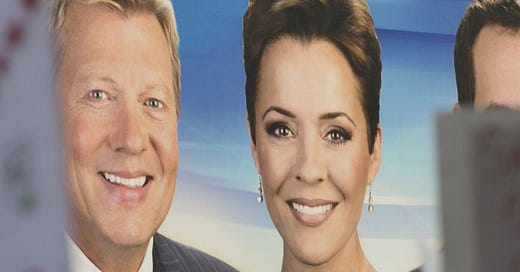On a recent episode of Slate’s Political Gabfest podcast, Washington Post Arizona bureau reporter Yvette Wingett Sanchez, a veteran Arizona-elections-watcher, predicted the outcomes of the four major statewide elections on the ballot on November 8.
The Senate, Attorney General, and Secretary of State races would all go to Democrats (Mark Kelly, Kris Mayes, and Adrian Fontes, moderates running against hard-right opponents) if narrowly, she said, but she was betting on hard-right Republican Kari Lake to prevail over Democrat (and current Secretary of State) Katie Hobbs.
Why? It’s simple: voters know Kari Lake from TV.
Before she was a 2020 election-denying, COVID-denying, Trump-loving zealot, Kari Lake was the co-host of the 5pm and 9pm local news on Fox 10 Phoenix for 27 years. “People know her,” Sanchez said, “people trusted her to deliver the news.” And moreover, in the minds of the ever-increasing number of independent and Republican voters who distrust the media, when Lake walked away from her job last year because she doesn’t “like where [journalism] is going,” she gained even more credibility.
Lake’s status as a local news celebrity in particular is an asset as a candidate: voters of all stripes have much higher confidence in local news than in national outlets.
But more broadly, she is a potent example of a truth that has become ever more true as our politics and culture have merged: first-time celebrity candidates have a huge leg-up.
We know from research that name recognition is a top-tier factor in a candidate’s electability; when looking at the ballot, absent any other information, voters are going to fill in the circle next to the name they’ve heard, and if they haven’t heard of anyone, they’ll defer to other indicators such as party identification.
Incumbent candidates benefit from this, of course, as they gain exposure during their time in office. But it doesn’t matter how the name recognition happens––from running for office, or hosting the news, or hosting a reality show. (And in fact, as Republican voters have gained a thirst for “outsider” candidates in the last few decades, gaining notoriety as a non-politician is particularly potent).
Republicans are running first-time candidates with high name identification and celebrity status in multiple key races: Dr. Mehmet Oz in Pennsylvania, college football great Herschel Walker in Georgia, and Lake in Arizona––who had 96% name recognition before the July primary (higher than Trump’s 92% early in the 2016 primaries). All three are wretched candidates in every imaginable way––trumpeting extreme, unpopular positions, close ties to a deeply unpopular former president, and (for especially Walker) a closet chock-full of shocking skeletons.
Two of them (Lake and Oz), it must be said, have an asset they share with Trump: decades of on-camera experience. Interviews, ads, and televised speeches are spliced, shared, and nitpicked more than ever––and telegenic candidates, by definition, benefit.
But regardless of media savvy (Walker has less than zero) all three are buoyed by their celebrity status, by the fact that there was a time before their candidacies when millions of people had a positive, totally apolitical view of them. It looks like Lake will win because of it, and Oz and Walker will, at the very least, keep it very close.
So, what’s the lesson for Democrats? Some pundits predicted that, after a disastrous Trump term, voters would look for political professionals to restore order, and Democrats should draft candidates accordingly; that’s what they did in 2020, and Joe Biden won. But if polls and likely results are any indication, shit-stirrers and outsiders are still appealing to not only Republicans but crossover swing voters as well.
I do not believe we should seek out shit-stirrers or extremists, nor do I believe we should loudly proclaim the inherent value of the “political outsider.” But weshould reconsider what seems to be an unspoken opposition in our party to candidates who are well known for something other than politics, who have built-in trust from, and comfort with, voters.
I firmly believe, for example, Matthew McCougnahey would have wiped the floor with Greg Abbott in Texas. Would he, without existing relationships or knowledge of the state’s systems, have been a particularly effective governor? Likely not; I grew up in Minnesota under Governor Jesse Ventura, and remember how well that went. But even an inert governorship in Texas would be miles better than the status quo.
Oprah for Senate in Mississippi! Beyonce for Governor of Texas! Taylor Swift for Congress in Tennessee!
I haven’t always felt this way, but at this point, our politics is a zero-sum game. With the GOP as lockstep and fascistic as it is, we have to win at all costs––even if that means prioritizing candidates whose primary expertise is talking smoothly, straight to camera.




